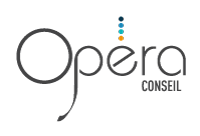Contributing to change acceptance through participation, communication, and training
In recent years, with the globalization of markets, technological advancements, and competitive rivalries, companies must continually adapt to improve their competitiveness. They must establish a new performance standard to turn the random and unexpected nature of change, loss of meaning and reference points, and the frequency and speed of transformations into an opportunity.
Management must give meaning by evolving the old vertical and Taylorian organization towards a network and project group-based organization.
OPERA assists you in getting teams to accept all this complexity of organization, business cultures, and establishes performance and continuous enrichment by carrying out the following actions:
Your concerns in Change Management
- make the link between a corporate strategy involving one or more transformation projects, and employees who are more or less ready for it
- make up for projects that were badly started, and in which we "forgot" to provide sufficient support to our employees (resurrect a project!)
- Identify potential resistance to change, given the organization's context and history
- s’assurer de l‘implication de la direction, des managers et collaborateurs
- communicate effectively on the reasons for change for the company (the "why") and the benefits for employees.
- Managing resistance
Opéra's change management offer
Organization
- Framework (taking ownership of the methodology, drafting a schedule for the process for the department, initiating the process with middle management, identifying users)
- Impact analysis (analyzing target processes and identifying gaps; establishing impact mapping for tools, business, organization, and culture; analyzing user perception of the project)
- Definition of an operational transition plan (adjusting operational plans, building tools necessary for the proper functioning of the target service, defining individual/collective business development plans, contributing to the adjustment of the business framework, formalizing expected changes in relation to HR, defining the operational switch-over plan)
- Definition of a user mobilization plan (to be determined service by service in coherence with the project's communication plan)
- Implementation and monitoring of the transition and mobilization plan (overseeing the implementation of the transition plan, conducting periodic feedback sessions between teams, reporting to HR, etc.)
Training
- Development of training strategy and training catalog
- Construction of the training plan
- Assistance with writing training materials
- Management of training logistics
- Facilitation of training sessions
- On-site functional support for users
Communication
- Preparation, management, and facilitation of the launch seminar (mission launch with relevant stakeholders, identification of key messages, project stakes, and initial engagement, development of the communication plan, establishment of a communication working group, validation by the strategic steering committee, and adjustments, …)
- Initiation and facilitation of necessary project meetings
- Support in carrying out communication actions: providing tools, methods, and expertise to local management (implementation of planned actions in the communication plan, on-the-ground measurement of communication effects, identification of additional communication actions based on field barometer results and project or company events, …)
Typical Deliverables:
- Communication strategy
- Regularly updated communication toolkit tailored to the needs of managers
- Regular project newsletter
- Perception survey among future users, allowing to test the progress of the 'Change' initiative on the ground and gauge the level of alignment.
Start-up support
- Implementation of support
- Skills transfer
- Implementation of continuous training program
Seminars
- Conducting change management seminars.

